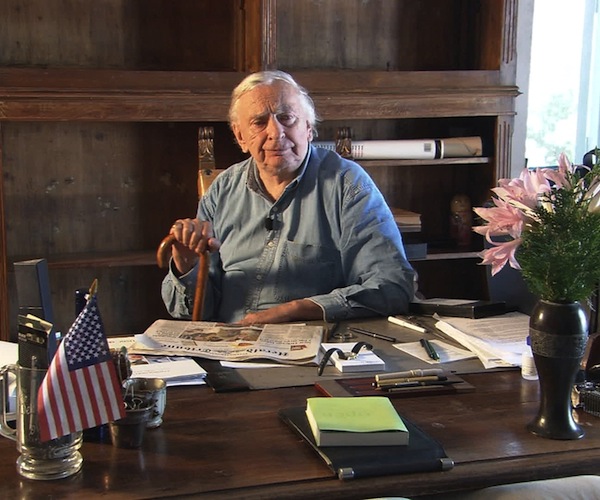Film Review: Gore Vidal — A Memorable Gadfly That Stung the Left and the Right
The haughty, witty Gore Vidal, my role model, was never happier than when going against the madding American populace.
Boston Area Film Schedules – What is playing today, Where and When

Gore Vidal in “The United States of Amnesia” — A top-drawer cynic in the American tradition of Mark Twain, Ambrose Bierce, and H. L. Mencken.
By Gerald Peary
As a pick-a-card-any-card-carrying member of the laughing left, also the snobby left, also the anti-puritan left, I was psyched for a documentary about haughty, witty Gore Vidal (1925-2012), among my cultural–and sexual–heroes. For Gore Vidal: The United States of Amnesia (at the Kendall Square Cinema), filmmaker Nicholas Wrathall takes viewers on a brisk, amusing promenade through Vidal’s enviable life—wealthy, globe-hopping, pals of the talented and famous—with ample time on his hands for the writing of dozens of books, for spirited runs for public office, for heralded and hilarious television appearances, and for a Bartlett’s run of snide, pithy bons mots, complementing those top-drawer cynics Mark Twain, Ambrose Bierce, H. L. Mencken, and with a peppery dash of Oscar Wilde.
“Give your life for your country? Fuck that!” said Vidal. “Never offend in a small way,” said Vidal. “I am a born-again atheist,” said Vidal. And, spoon feeding the movie’s title: “You can’t expect a democracy of a place like this: the United States of Amnesia.”
Vidal shared with rich conservatives a disrespect for the undereducated American common man. But that didn’t stop him from loathing the politics of the Republican Party, which, he said, made sure there was “socialism for the rich. The rich are living off the federal government.” Consider his contempt for “the embalmed” Ronald Reagan: “39 % of Americans believe in The Rapture, including the President.” Naturally, George W. also riled him: “Junior wanted the war in Iraq. Certainly his boss, Cheney, did. Certainly we’ve had presidents before who were terrible, but never before a goddamned fool!”
Beholden to no one, Vidal stabbed his fellow Democrats just as often, for being barely different from Republicans. It was Truman, he complained, who made America “a national security state.” JFK was his friend, but that didn’t inhibit Vidal from stepping away because of Kennedy’s anti-Communist posturing: “He did practically nothing as president except maintain his image.” Vidal didn’t accept the appealing Camelot myth that, before his assassination, Kennedy was rethinking American involvement in Vietnam. Vidal: “He would have been as deeply into it as Johnson.”
“I liked him tremendously,” Vidal said later of John Kennedy, and then explained why he kept JFK’s photo on his wall: “It’s to remind me to never be taken in by anyone’s charm…One of the most disastrous presidents we ever had.”
Wrathall, as he should, gives us Vidal’s most infamous moments, all televised. There’s his rambunctious fight with an inebriated Norman Mailer on The Dick Cavett Show. Even better, there’s the 1968 cocksmen battle, incredibly nasty, with fellow patrician, William Buckley, in which Vidal smeared the rightist TV host as “a crypto-Nazi,” and the apoplectic Buckley smeared back, calling Vidal “a queer.”
A queer he was, probably. Maybe. Vidal always said, “Everyone is bisexual.” A full decade before anyone else spoke up in public, Vidal was asserting in the 1960s that sex roles are protean: “We have something Andre Gide called ‘floating sexuality.’” Vidal deserves far more recognition, and our appreciation, for being a courageous, outspoken sexual pioneer. Going back: his 1948 book, The City and the Pillar, was perhaps the first mainstream novel ever in America with explicit gay sex.
Anaïs Nin claimed she and Gore had an affair, which Vidal denied. So what women did this “bisexual” ever sleep with? We do know that he and Tennessee Williams traveled across Europe together. We also know that he lived for many, many years with a gay man, Howard Auster. Vidal always insisted that they were just friends, that sex gets in the way of work, so there wasn’t any.
Whatever, like Gertrude and Alice B. in Paris, Gore and Howard entertained royally at their estate on the coast of Italy. Tim Robbins, interviewed in the documentary, talks of he and Susan Sarandon being invited for dinner there, and worried if they could bring their kids. The other guests that evening proved to be the families of Bruce Springsteen and Sting.
What kind of writer was Gore Vidal? I confess that, much as I admire him, I’ve read only a little of his work. One short story collection, A Thirsty Evil, scattered essays, but not even the megahit Myra Breckenridge. And none of his best-selling historical novels, not even Burr. Are they any good? Do his Broadway hits, The Best Man and Visit to a Small Planet, hold up to scrutiny? It’s my Vidal-like snootiness that probably has kept me away. I’m suspect of any artwork that’s really popular.
“Art is the enemy of democracy,” said Vidal.
Gore Vidal, my role model, was never happier than when going against the madding populace. If there’s one image that will stick with me from Gore Vidal: the United States of Amnesia, it’s the protagonist watching on TV 2008 election night, his eyes rolling suspiciously while every other liberal in America (me too) was gooey over our first African-American president. “I’d like to believe he’s completely virtuous,” Vidal addressed the camera about Barack Obama. “I suspect he’s not.”
Gerald Peary is a professor at Suffolk University, Boston, curator of the Boston University Cinematheque, and the general editor of the “Conversations with Filmmakers” series from the University Press of Mississippi. A critic for the late Boston Phoenix, he is the author of 9 books on cinema, writer-director of the documentary For the Love of Movies: the Story of American Film Criticism, and a featured actor in the 2013 independent narrative Computer Chess.
Tagged: American satire, Gore Vidal, Gore Vidal: the United States of Amnesia
